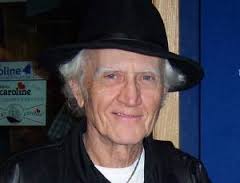Back in 1957, singer Terry Dene looked like being the ‘golden boy’ of British pop…
 With hit records, a film star, and appearances on stage and TV he was riding high before it all went pear-shaped. It was actually in a wrestling ring, in between bouts I might add, that Terry had given an impressive performance that would earn him a run of live appearances on Six-Five Special, BBC TV’s new show for the younger set.
With hit records, a film star, and appearances on stage and TV he was riding high before it all went pear-shaped. It was actually in a wrestling ring, in between bouts I might add, that Terry had given an impressive performance that would earn him a run of live appearances on Six-Five Special, BBC TV’s new show for the younger set.
It also got him a record deal with Decca with whom he enjoyed a sizable chart hit with his cover of Marty Robbins country-pop hit, A White Sports Coat (and a pink carnation), selling in excess of 300,000 copies.
With all this action, Terry then starred in a film musical, in a similar fashion to Elvis and Tommy Steele. Titled ‘The Golden Disc’ it was made by budget film producers, Butcher Films, and centered on a young couple who break into the record biz and help a young singer to become a success, and to cash in on the start of the rock and roll era.
The young couple, Harry Blair (Lee Paterson) and Joan Farmer (Mary Steele), get together with the girl’s Aunt Sarah (Linda Gray) and transformed an old café into a bright new coffee bar, which then includes a record shop, and set up their own recording outlet. This includes their own record label, Charm, named after the Lucky Charm coffee bar.
Also helping them is our boy Terry, who just happens to be a promising young singer. With Harry and Joan’s help, Terry makes a recording of his innocuous rock’n’roll ditty C’min & Be Loved which becomes a hit. He’s then approached by a rival record label boss (played by veteran actor Ronald Adam) to sign with them.
However, good ol’ Terry stays loyal to his pals at Charm and records more songs like Charm, Candy Floss and The Golden Age.
The film’s other musical treats include crooner Denis Lotis with a nauseating I’m Gonna Wrap You Up, and Mary Steele’s numbingly boring contribution Before We Say Goodnight . More lively was Dynamo by Afro-Caribbean skiffle combo Les Hobeaux, seen performing in a coffee bar, and includes guitarist Les Bennetts (later with Lonnie Donegan) and bass-player Brian Gregg (later with The Pirates and Tornados).
In the recording studio, under Harry Blair’s guidance, we see another skiffle outfit, the Sonny Stewart Skiffle Group recording Let Me Lie.
Also in the studio, the Terry Kennedy Group (with a young Clem Cattini on drums) is backing Terry Dene on Candy Floss. Jazz drummer Phil Seaman appears quite ‘spaced-out’ on the groovy instrumental Lower Deck. British ‘torch singer’ Sheila Buxton sings The In Between Age, which was the film’s alternative US title song.
Rival to Eddie Calvert, trumpeter Murray Campbell offers the regal instrumental Balmoral Melody and skiffle Queen Nancy Whisky warbles the folksy Johnny O.
The Lucky Charm operation goes from strength to strength as the film comes to a happy ending with Terry singing his hit song surrounded by the coffee bar’s young patrons, plus one old miserable git who’s constantly seen and credited in the film as ‘morose man’ (a bit like me). Other cast members include actor Canadian actor Peter Dyneley and presenter David Jacobs.
The film provided Terry with a great boost to his career, and added to this was his well-publicized marriage to young songbird Edna Savage.
The couple had met in 1957 while on tour in Blackpool, and as the tour progressed, Terry and Edna’s relationship intensified. Sadly all was not that rosy for Terry who had his demons possibly brought on by a seemingly restless nature, having had six different jobs since leaving school.
However, while on tour with Edna, after she had rejected the love-lorn singer, he went on a drunken rampage.
Off the road for three months, in May Terry’s record of Stairway of Love hit the charts and stayed there for eight weeks, helping him to get his career back into gear. His problems with drink were well-publicized which gave the press cause to brand Terry as a ‘bad apple’ and shown as an example of how bad an influence rock’n’roll was on the young.
This was, of course, a load of crap as rock’n’roll never made me and many others want to go around wrecking things, did it?
But there was more trouble when Terry received his call-up papers and was due to join the King’s Royal Rifle Corps on July 7, 1958, at Winchester Barracks. His call-up was initially deferred until contractual commitments had been completed.
When he eventually did go in, it was handled really badly by the media (who filmed and publicised his arrival at the barracks). He was scrutinised so much that, after two months, Terry had to be discharged on medical grounds as he’d had some sort of nervous breakdown after receiving threats from his fellow conscripts.
Adding further to his problems, he received a letter from Mrs Dene, Edna, who was reported to have said she wasn’t prepared to wait two years for him to do his national service and was going off with another man. Naturally, this unnerved Terry even more so and he was put into an Army hospital where he was ‘unfit for Military Service’.
Although it was the press who, sadly had almost ruined Terry’s career, as compensation, the Army offered him a pension which Dene, in fact, refused. Fortunately, Edna was waiting for him at home as he planned his comeback into showbiz. Larry Parnes’ gave Terry the opportunity to make a comeback and put him on a tour around Britain.
Unfortunately, due to press reaction, he received hate mail and was called a ‘coward’ by members of the public. On a tour with Dickie Valentine, he was faced with booing from members of the audience. Outside one theatre, Valentine’s car was mistaken for Terry’s and received considerable damage from lame-brain yobs.
The association with Parnes was short-lived as was Terry and Edna’s marriage. Thankfully, Terry managed to survive the problems and he became a Christian and moved to Sweden. In 1984, he re-emerged by way of a TV documentary, being interviewed by Zoot Money.
He subsequently made a triumphant return to performing live, headlining a number of rock’n’roll events and proved that he’d still got a lot of great rock’n’roll music in him. In 2002 he was also the subject of the excellent TV documentary ‘Poor Boy’ in which he recalled the highs and lows of his career.
Over the years since the 80s Terry’s recordings have been re-evaluated by way of several compilation albums and is now hailed as one of Britain’s great early musical heroes – and rightly so, too.


